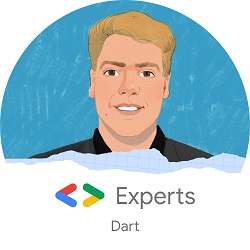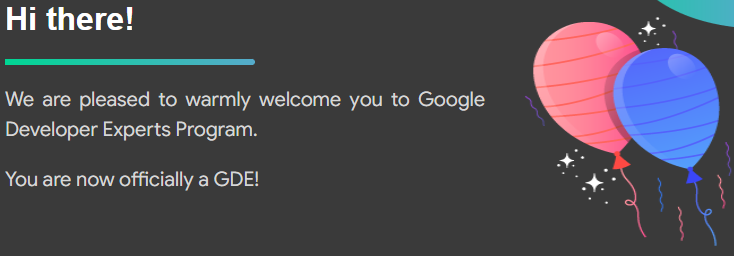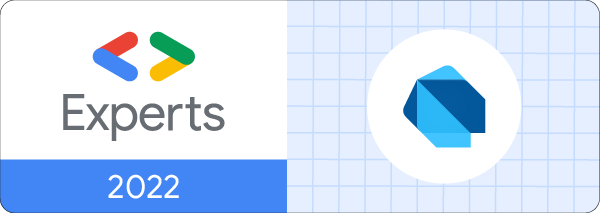Google Developer Expert
I mentioned in my August 2022 post that I’d write separately about this, so here goes…
The Google Developer Experts program is a global network of highly experienced technology experts, influencers, and thought leaders who have expertise in Google technologies, are active leaders in the space, natural mentors, and contribute to the wider developer and startup ecosystem.
Google Developers – Experts
Background
Atsign has been working with the Dart & Flutter community since before I joined the company, and a bunch of the community leaders we’ve worked with as advisors are Google Developer Experts (or GDEs as they’re most commonly abbreviated). My colleague Anthony, who leads our developer relations efforts, thought it would be a good idea for us to have our own GDE (or GDEs), and initially suggested that I help mentor one of the team through the process. That plan didn’t survive contact with reality, though I’m hopeful that in due course we will grow more GDEs in the company.
Having taken a look at what was needed I ended up suggesting that I could apply myself. I’d been talking about Dart, writing about Dart, and generally trying to get my friends in the industry interested in Dart since shortly after starting with Atsign. So maybe I could do it.
Mentor
I reached out to Majid Hajian for guidance through the process. He’s one of the most visible people in the community through his work on Flutter Vikings, and I’d had the pleasure of meeting Majid and speaking alongside him at last year’s Droidcon London.
His primary guidance to me was to catalogue everything I’d done in the community as preparation for the application process. So I pulled together a spreadsheet of every presentation, every appearance on webcasts, every blog post, every GitHub issue and pull request, and the analyst coverage I’d contributed to. Once that was ready Majid sent me a link to the application form.
Step 1 – Application form
The programme uses a platform from Advocu, and the ‘Eligibility Check’ begins with filling out a form detailing all those community activities. For each item there’s a measure of impact – how many people attended the talk, or watched the video, or read the blog post? Majid’s advice helped a lot here, but I didn’t have detailed/accurate numbers to hand for some of the items, which left me fretting a little about one particular post where I’d guessed it reached 250 people then subsequently learned it had been over 5000.
Talking to other GDEs (and aspiring GDEs) this seems to be the stage where most people trip up. They either don’t have enough quantifiable impact on the community, or their work is seen as too entry level and they’re directed to produce stuff that’s aimed at an intermediate/advanced audience.
Steps 2 & 3 – Community Interview and Product Interview
Having thankfully passed the eligibility check the next steps were a couple of interviews; firstly with an existing GDE, and then with a Googler. They both went pretty much the same, with the conversation focussing firstly on presentations I’d done in the past (on things like Dart in Docker on Arm) and then new things I’m working on (like comparison of Dart ahead of time [AOT] binaries to just in time [JIT] snapshots, and the little compiler bug I’d found on my adventures). My product interview also strayed into some discussion about product roadmap, and areas where I saw frustration.
In both cases the interviews didn’t feel like a grilling designed to find weaknesses in my knowledge, but rather a chat between enthusiasts about areas of interest and how we can make things better for everybody.
Step 4 – Legal Sign Offs
The GDE programme exposes members to pre release information, so naturally Google asks for confidentiality using a non-disclosure agreement (NDA). As NDAs go it’s one of the shortest, simplest and fairest I’ve seen, so I had no hesitation in signing (other than it needed to be redone to get my correct full legal name).
Step 5 – Onboarding
I missed my onboarding meeting due to a prior commitment, so as I write this I’m not quite fully onboarded to the programme. But I’ve received lots of invites to online groups etc., and also a whole bunch of materials that I can use to help with future presentations etc.
There are badges, like this one:
The community
Days after receiving the good news I was in Oslo for Flutter Vikings 2022, which was quite the gathering of the European Dart & Flutter community, with many of the GDEs from the region there. It was a great event, and I had a great time meeting folk and chatting about what we’re building at Atsign and how we’re using Dart at the heart of that. More on the event from Anthony in his writeup.
Next…
I’ve got some talks about Dart coming up for QCon San Francisco, and QCon Plus, and I’m sure there will be more towards the end of the year and into 2023. Of course I’ll be keeping track of those in the Advocu platform that’s used to help decide if people remain in the programme from one year to the next by showing continuing contribution to the community.
As I looked at other GDEs LinkedIn profiles to see how they present themselves I saw that the most popular choice (and in fact the Google suggested approach) is to add it to the Volunteering section. GDE isn’t a certification or an honour or award. It’s a bunch of volunteers, helping their communities grow and learn. I look forward to the future presentations, because I’ve enjoyed doing that stuff for a long time; but I also look forward to the behind the scenes stuff – mentoring, guiding, interviewing future GDEs, and helping the Google product team do the best job they can.
A footnote on imposter syndrome
Something that initially put me off applying for the programme is that I’m not the world’s greatest Dart programmer. There are probably half a dozen better Dart developers than me just at Atsign, and we’re a tiny startup. If the product interview was anything like the dreaded whiteboard sessions in most technical interviews then I was doomed to fail. But it quickly became clear that GDE is about developing talent, and being open to learning, rather than being the stereotypical ‘expert’ developer. It’s not necessarily about writing in Dart (or any of the other Google Developer tools) all day every day, it’s about community contribution, and that takes many forms beyond just writing code.
People who know me well may wonder why I didn’t apply to become a Google Cloud Platform (GCP) Expert? I’ve been using GCP since the launch of Compute Engine, I got the Professional Cloud Architect (PCA) certification (now expired), and I use GCP pretty much daily in my Atsign work. But I’m not an active member of that community, I don’t got to events and talk about GCP, apart from some very specific product management calls it’s not a platform where I feel I’m pushing things forwards. It’s different with Dart, I may not be the best coder, but I’ve found a few things where I could make my mark, and I just have to remember that when the shadow of imposter syndrome looms.
PS anybody wanting to learn more about imposter syndrome and dealing with it should check out one of Jessica Rose’s talks on the the topic.
Filed under: technology | 1 Comment
Tags: Atsign, Dart, Developer Expert, GDE, google, imposter syndrome



Congrats on becoming a GDE, Chris!
And thank you for sharing your experience with imposter syndrome and the link to Jessica Rose’s talks. To say I look up to you is an understatement, and I selfishly feel a whole lot better knowing that it’s something you have to contend with, too. I’m certain that I’m not the only one feeling seen and even a little more confident after reading this!